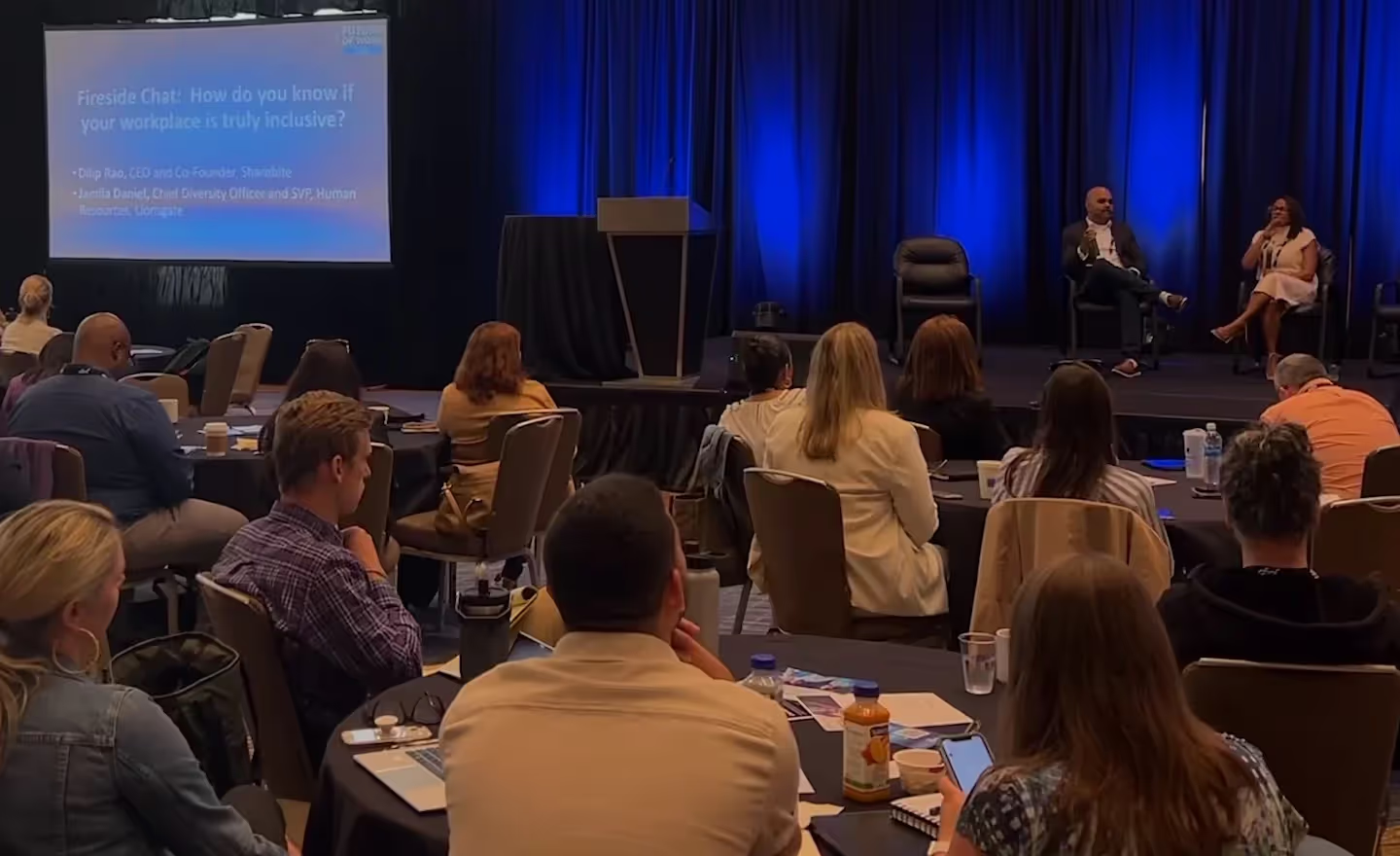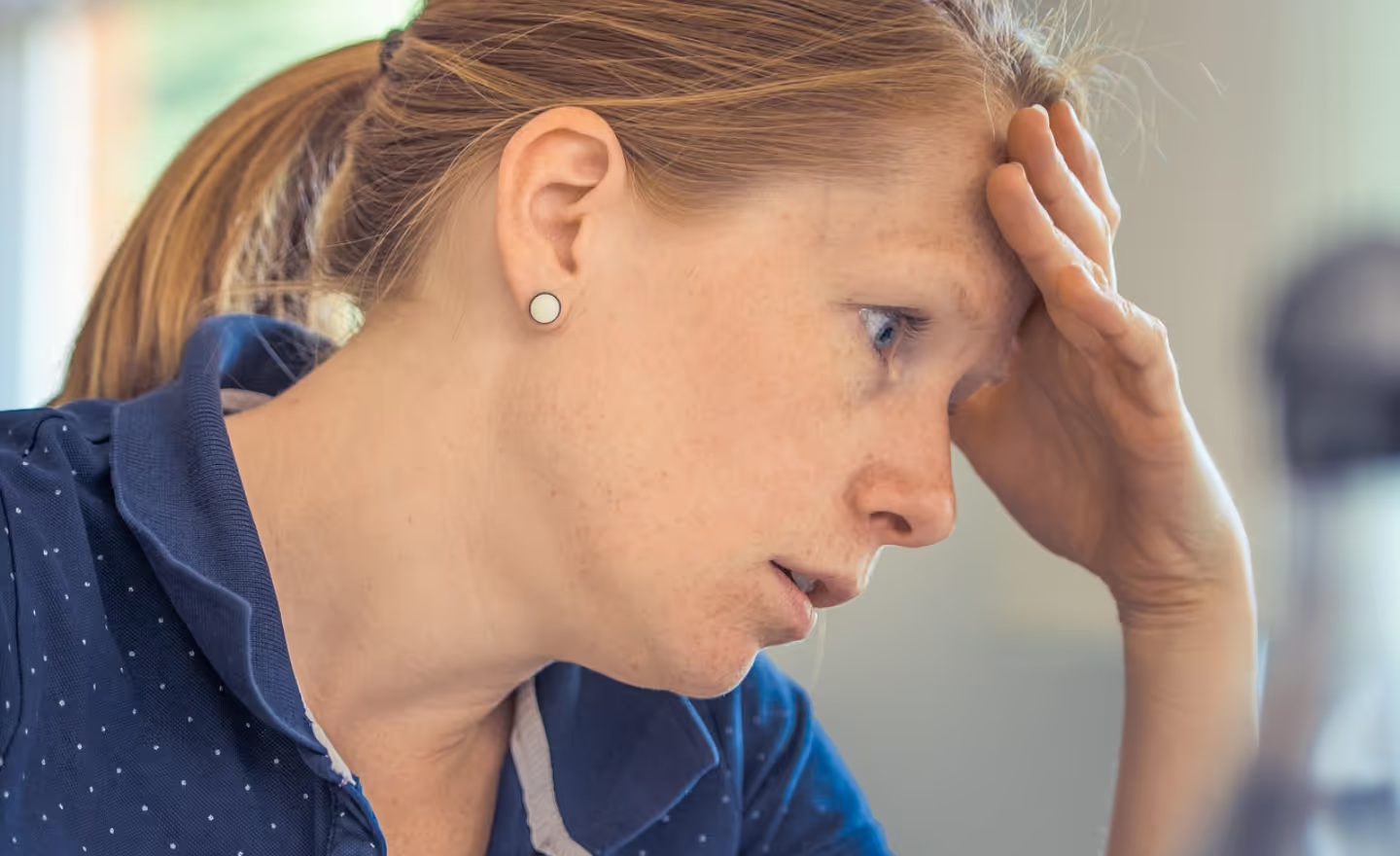Last week, I traveled to the Windy City to join hundreds of HR, Workplace Experience, and Total Rewards leaders at the Future of Work USA Conference.
From listening to thought-provoking sessions to meeting attendees in between, it was inspiring to see so many passionate people come together to discuss the future workplace.
The conference covered everything from L&D programs to DEI initiatives. To hone in on DEI and explore ways to make the workplace truly inclusive, the Chief Diversity Officer & SVP of HR at Lionsgate & Starz, Jamila Daniel, joined our Co-Founder & CEO at Sharebite, Dilip Rao, on stage.
Here are my top takeaways from their session:
Diversity is More Than an Input
Of course, hiring for diversity is a vital part of building a diverse workforce, but a company’s DEI initiatives shouldn’t stop there. When Rao asked Daniel what “diversity in the workplace” meant to her, she shared, “You could hire everyone under the sun, but if you don’t create an environment where people feel like they belong, have the ability to grow, thrive, and get promoted, they are not going to stay.”
So how can leaders make diversity more than just an input? Daniel explained, “When we talk about a truly inclusive working environment, we have to do the pre-work and build the foundational elements first. What we’ve done at Lionsgate & Starz is look at all facets of the business through a DEI lens and ask ourselves, ‘what are we doing here that creates an inclusive environment? What are the things that are barriers to that, and how do we rectify them’?”
DEI is Now DEIA
A new letter has recently been tagged onto DEI: “A”. “A” stands for “Accessibility” and focuses on supporting employees with disabilities, those who are neurodivergent, and those who don’t have access to certain resources. During their session, Rao and Daniel chatted about the evolution of the term, DEI.
“We’re seeing now that DEI is really DEIA,” Daniel stated. “I think a lot of times, people with disabilities and neurodiversity are often left out of the conversation, so I think we need to be very intentional in expanding the definition of DEI. Oftentimes in the workplace, people reduce diversity to be what they see outwardly, when we know there’s such a richness of the complexities of humans. All of those differences create more innovation, creativity, productivity, and profitability.”
HR Blind Spots Can Be Identified
In today’s workplace, it can be challenging for companies to figure out how to better support their employees. Some leaders don’t see their employees face-to-face in the office, and HR blind spots can still form for those who do.
To uncover how companies can proactively avoid this, Rao asked Daniel how leaders can identify their HR blind spots – whether their employees are remote, in-person, or a combination of both.
“With a diverse employee base, you need to have diverse benefits, perks, and offerings,” Daniel advised. “Where the blind spots come into play is when you say ‘well this is what we’ve always done and offered’ and not really listen. Create opportunities and platforms for [employees to give feedback] – whether that’s surveys, open door policies, town halls, or employee resource groups.”
Leadership Training is Key
In order to make employees feel comfortable enough to give that feedback, managers should be trained on how to create safe spaces for their teams.
“How can you equip managers to create environment safety, since there is a good chance that the bulk of your employees are not going to come to HR?” Rao asked Daniel. “What has worked well for you?”
“All of our people leaders go through mandatory inclusion leadership training,” Daniel shared. “On a base level, we give them some tools. How do you create space in a meeting if someone is off camera and having a rough day? How do you acknowledge what’s going on? We speak to this constantly through communication.”
“From an HR front, we work very closely with our leadership to check in and make sure they feel comfortable enough,” she added. “There has been a higher level of comfortability with managers in creating that space. A lot of times, it’s not that they don’t want to, it’s that they’re nervous they are going to say the wrong thing or do the wrong thing. But part of our whole approach to DEI is saying ‘this is a journey, this is an evolution, and we are all learning’. The more you can create that sense of ‘we’re in this together and moving in the right direction’, it goes a long way – and employees recognize that.”
Employee Wellbeing is a Top Priority
Since DEIA and wellness are so closely related, Rao and Daniel wrapped up their session by discussing why it’s so important for leaders to prioritize employee wellbeing.
“We are humans, we’re complicated and multidimensional. We’ve talked about wellness: financial wellness, physical wellness, and now, mental wellness. With the pandemic, we’ve talked about wellbeing and what we’re doing as organizations to help our employees be the best that they can be. If they are the best they can be in a high-level sense, they are going to be the best they can be in the workplace.”
So how can companies actually make employee wellbeing a top priority? When asked this, Daniel answered, “Rolling out benefits and perks. We brought Sharebite on board when we brought folks back to the office because we realized there is a cost to coming into the office. Sharebite runs our meal program, so we subsidize lunch for our employees and it goes a long way. We have offices in LA, Denver, and New York where the cost of living is very high. There is a cost to coming into work, whether it’s commuting, your time, your mental wellbeing, and also the tangible monetary impact.”
___________________________________________________
As we look ahead into the future of work, DEI will – and should – continue to be top of mind for company leaders. The end goal? To make the workplace truly inclusive.






